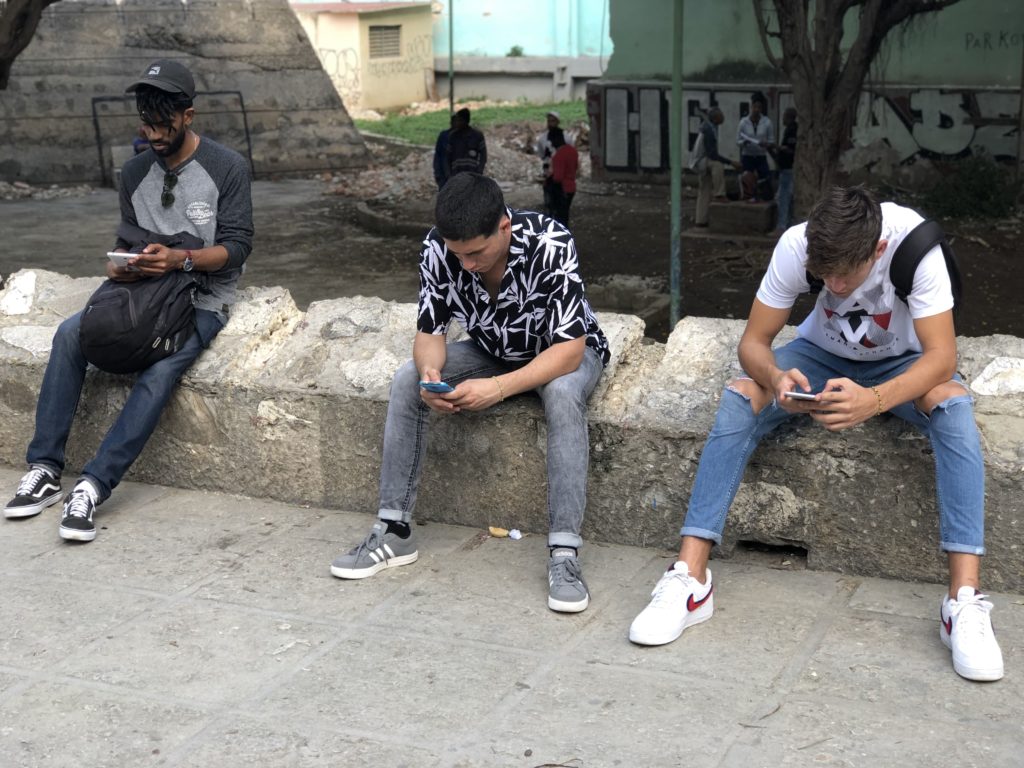
Regina Coyula, 20 September 2019 — During a special appearance by Cuban president Miguel Díaz-Canel on the September 2019 broadcast of the talk show Roundtable, several Twitter users complained about a number of accounts which have been blocked on the platform. Many, though not all, were linked to the news media. The suspended accounts included those of Roundtable and its presenter, Randy Alonso Falcón, the official news website Cubadebate, the Cuban Union of Journalists (UPEC), Radio Rebelde, Granma Digital, Canal Caribe and the Ministry of Communications. The account of Oliver Zamora Oria, the Cuban correspondent for Russia Today, was also among those suspended.
The reaction was swift. Using hashtags such as #CensuraVsCubaenTwitter, officials, journalists and supporters of the ruling party — including Díaz-Canel himself —denounced the suspensions as an anti-Cuban operation orchestrated by the United States government. “The U.S. State Department’s Internet Task Force for Cuba issued recommendations last June which called for using the platform as a highway of subversion in Cuba,” read an official statement issued by UPEC regarding the suspended accounts.
It is paradoxical to see a campaign in which labels referencing freedom of the press and democracy are used by parties which despise both concepts and operate in ways counter to them.
Many of those protesting seem to ignore the fact that Twitter has terms of service, the violation of which carries a penalty.
The Computerization of Society initiative has increasingly given rise to what we might call the “cyber trench” in the Battle of Ideas*. A large number of public officials have opened Twitter accounts while journalists have increased their cyber presence and activity on social media. Many of them enjoy what in Cuba is popularly known as the “oil tanker phone,” a mobile device paid for by the institution to which an individual is affiliated and whose purposes include the “defense of the revolution.”
A review of most of these accounts reveals that an overwhelming number of posts by official news outlets, members of the Council of Ministers, the National Assembly, the president’s office and the president himself are retweets. These accounts produce very little original content or content related to the professional activities of these individuals and institutions.
In turn, all of these posts are replicated by an army of trolls, dubbed by Cuban users as cyberclarias. They generate massive numbers of fake profiles whose sole purpose is to spread the content of accounts a user follows.
It is a huge and varied scheme. Nearly all the trolls, if not all those I have listed, follow the account of President Díaz-Canel. They can then alternately follow those linked to Cuba’s vice presidents, government ministers, party secretaries, officials at different levels, directors of institutions, official media outlets and some foreign press outlets. They also tend to follow international politicians such as officials from the governments and institutions of Venezuela and Nicaragua, Bolivian president Evo Morales, and former presidents Lula da Silva, Cristina Fernández and Rafael Correa. Having done this, they then follow each other.
Although fake profiles are identified by specific professions, they generally do not follow other accounts related to the profession to which they claim to belong. They don’t sleep, they don’t work and some tweet at a frenetic pace, almost by the minute, retweeting thousands of posts from the accounts they follow. They use random images downloaded from the internet as a profile pictures without giving it too much thought. And a nice detail: they usually choose photographs that align with western standards of beauty.
Among the profiles created for ideological propaganda purposes are some which post original tweets with the goal of starting trends.
Such large scale, irregular activity should not have gone unnoticed by Twitter. Shortly after Díaz-Canel’s September 11 appearance on Roundtable the tweet storm began. It was probably then that Twitter decided to suspend many of these accounts.
Ultimately, almost everything will go back to normal and the real accounts will be reinstated, as happened in Venezuela. After a similar episode, many were restored.
I will put aside the questions I always ask myself when I stumble upon hordes of fake accounts: Why do those who defend the government create fake accounts? And why do they want to remain anonymous if they are defending the truth about Cuba and have the support of those in power?
Originally published on YucaByte.org on September 13, 2019
*Translator’s note: The use of the term “Battle of Ideas” was formalized by Fidel Castro as a ’stage’ of the Cuban Revolution in response to the case of the child rafter Elian Gonzalez. According to Ecured.cu, a Cuban government website, it consists of five major ’battles’ and around 200 programs.
